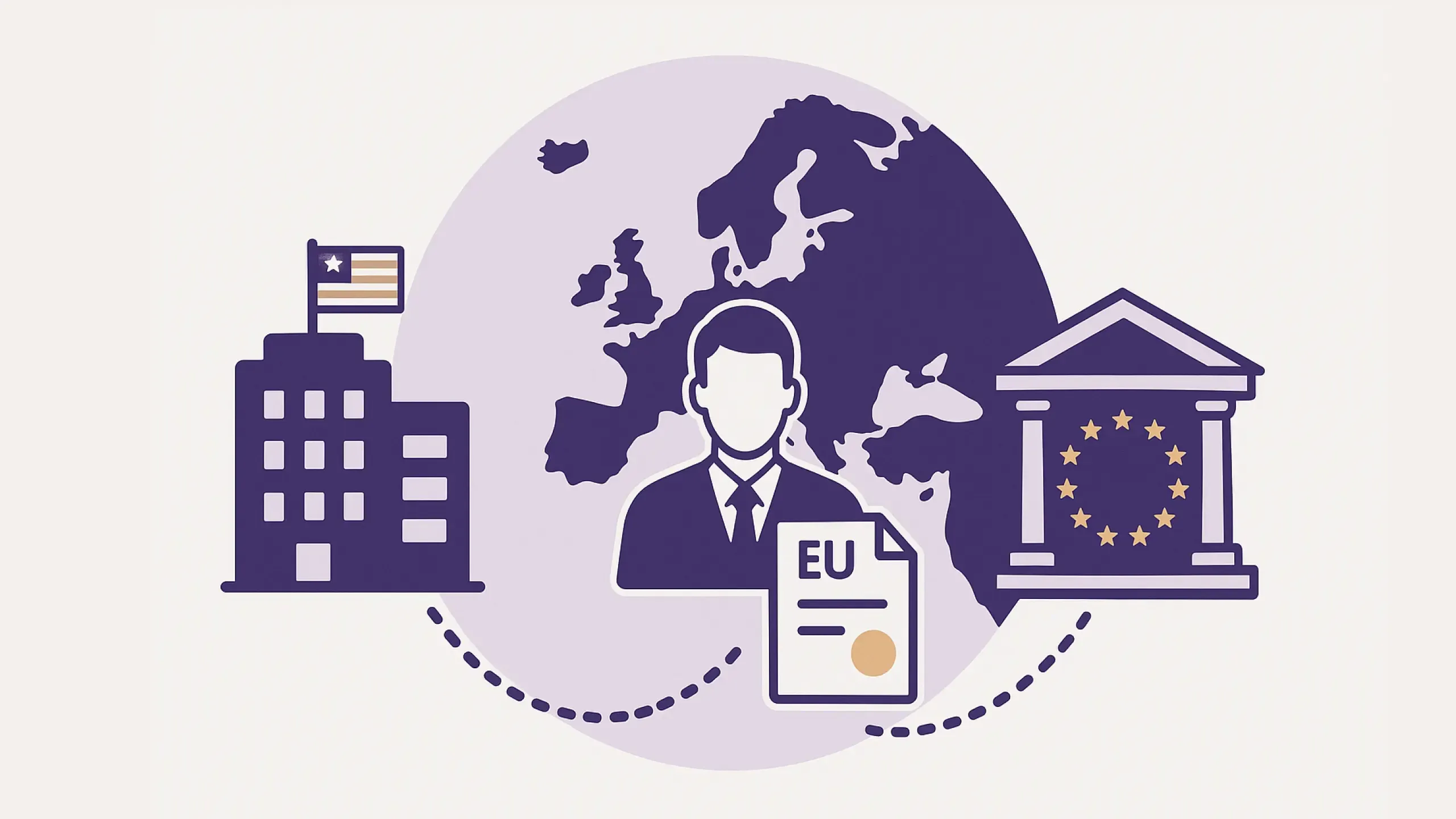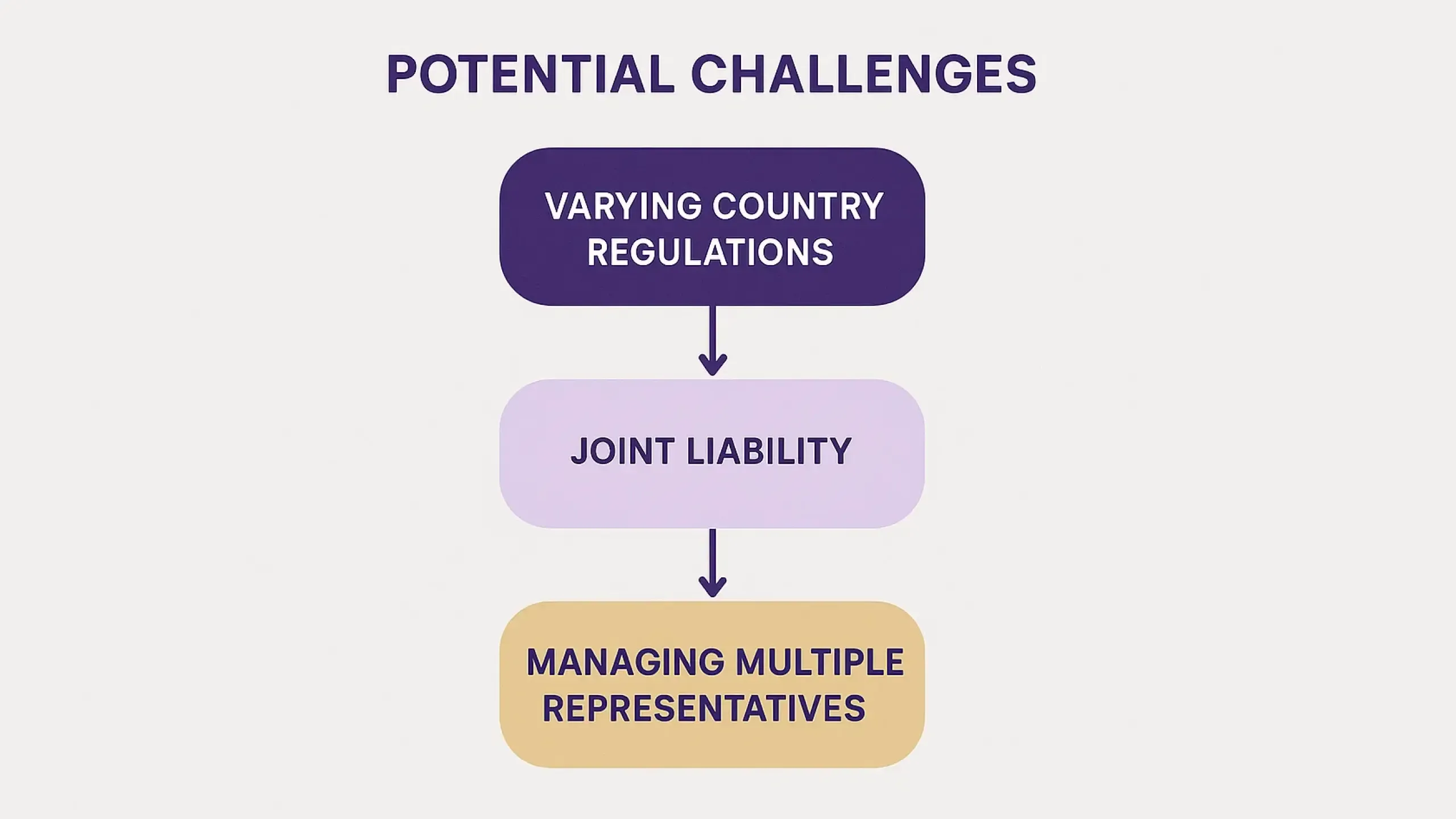VAT Services for US Companies: Understanding Fiscal Representation for Non-EU Businesses
If you're a US-based CFO expanding into European markets, you've probably encountered the term “fiscal representation". While it may sound complex, it's a crucial part of VAT compliance for any non-EU business operating in the EU. This article breaks down what fiscal representation means, why it's important, and how it can simplify your tax obligations. Whether you're navigating EU VAT rules for the first time or just need a refresher, this guide will help you understand how an EU VAT representative can streamline operations and keep your business compliant.
What Is Fiscal Representation?

Fiscal representation is when a specialized third party - often referred to as an EU VAT representative - manages VAT and related tax obligations on behalf of a non-EU company. They communicate directly with local tax authorities to ensure returns, payments, and filings are accurate and on time. Since VAT rules vary across EU member states, some countries require non-EU businesses to appoint a fiscal representative if they engage in taxable activities within their borders. According to the European Commission’s official VAT guide, a fiscal representative acts as an intermediary and ensures that all tax declarations made by the foreign company comply with local regulations across EU member states. For a deeper look at cross-border VAT rules and when a representative is required, see Owning Business Outside EU: Here’s What You Should Know About Tax.
Key Points in a Nutshell
-
Fiscal representation isn’t solely about checking boxes; it ties directly to how you handle taxes and filings in specific EU countries.
-
Some member states, such as Spain, mandate a fiscal representative for non-EU businesses in specific VAT scenarios. Local tax authorities require non-resident companies to appoint a representative when carrying out taxable operations within the country.
-
In other countries this practice might be optional, yet many companies still appoint an EU VAT representative to cut through complex regulations.
Key Benefits for Non-EU Business VAT Compliance
Non-EU businesses face plenty of hurdles when entering new European markets. That’s why fiscal representation can be a real life-saver. It tackles more than just filing forms; it helps you maintain good standing, ensure accurate documents, and eliminate many risks. For expert support navigating these hurdles or streamlining cross-border compliance, see VAT Consulting for International Businesses.
Benefit Overview
-
Reduced Red Tape – A local specialist tracks constant VAT updates, letting you focus on bigger-picture financial management.
-
Fewer language barriers, since your representative communicates with tax authorities in their native tongue.
-
Enhanced Cash-Flow Management – Certain EU countries permit VAT deferment through fiscal representation, improving immediate cash flow. (You might reclaim VAT faster or pay it later, depending on local rules).
-
Peace of Mind in Compliance – Having an on-the-ground contact means fewer nasty surprises if regulations shift. (They spot common pitfalls early and keep your transactions valid).
Which Countries Require a Fiscal Representative?
Rules differ widely among EU countries. For example, in the Netherlands, customs forwarding agents are permitted to act as limited fiscal representatives under certain conditions, as defined under Dutch legislation aligned with the EU VAT Directive (Directive 2006/112/EC). Understanding each market’s requirements is essential for smooth operations. See EU – Single VAT Registration and Modernization of Tax Reporting for a comparative overview.
Potential Challenges and Pitfalls

While fiscal representation offers many advantages, stumbling blocks remain. According to the European Commission’s VAT guidelines (2023), each member state can have its own registration procedures, invoicing requirements, and reporting rules. This creates extra complexity for non-EU businesses. (See the 1stopVAT UK case study for real-world insights.)
Key challenges:
- Different rules per country
Filing deadlines, invoice formats, and registration steps vary widely.
Solution: Use VAT software or multi-country consultancies.
In some countries, your VAT representative is liable for your tax debts.
This means stricter checks and higher service fees.
Expanding across the EU may require separate reps in each country.
Many companies opt for a single advisory firm with EU-wide coverage.
Clear communication and strong workflows help prevent costly mistakes.
Handling Non-EU Business VAT Compliance
Some non-EU companies centralize VAT compliance through one primary advisory firm that works with local representatives as needed - for example, a Canadian e-commerce retailer operating in France and Germany relies on a single EU-based consultancy for unified filing and consolidated reporting.
Comparison: EU VAT Representative vs Direct Registration
Sometimes businesses register directly for VAT in an EU country without a fiscal representative. Experiences vary by size, complexity, and scope.
Direct Registration:
- Pros: Full control over compliance data; fewer third-party fees; direct relationships with tax authorities.
- Cons: Requires deep local knowledge; language barriers; unfamiliar admin procedures.
Working with a Representative:
- Pros: Expert guidance minimises mistakes; local insights into policy changes.
- Cons: Service fees; representatives may impose rigorous vetting due to shared liability.
When Is Direct Registration Practical?
According to the European Commission, some EU member states require non-EU businesses to appoint a fiscal representative when performing taxable activities within their territory. This obligation is intended to simplify compliance for foreign businesses by ensuring proper communication with local tax authorities and adherence to national VAT rules, which can differ significantly across jurisdictions.
Real-World Examples of Fiscal Representation
Example 1 – US Electronics Exporter to the Netherlands
A US electronics firm appointed a limited fiscal representative via a Dutch customs forwarding agent, benefiting from VAT deferment without long-term warehousing. This eased cash-flow pressure during its initial European entry.
Example 2 – Non-EU Health-Supplement Company Selling in Spain
A non-EU health supplement brand appointed a fiscal representative to handle Spanish VAT submissions and act as a local liaison. The monthly fee was offset by smoother compliance and faster market growth.
Quick Definition of Fiscal Representation
Fiscal representation is when a non-EU company appoints an official local specialist to oversee its VAT obligations in a particular EU country - communicating with the tax authorities, filing returns and ensuring that all rules are accurately followed.
Conclusion
Fiscal representation is not just a legal necessity for non-EU companies; it is a strategic move to optimize VAT compliance, minimize fines and gain local expertise. Whether you register directly or appoint an EU VAT representative, weigh your resources against the complexity of working independently. With the right guidance, you will effectively manage compliance and focus on expanding into exciting new markets.








